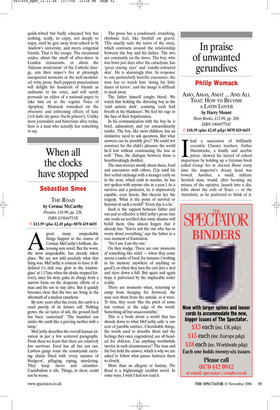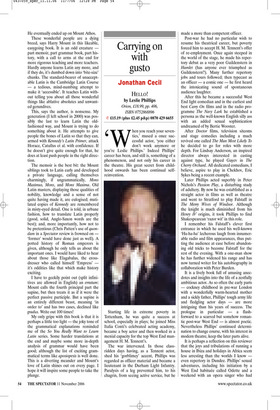In praise of unwanted gerundives
Philip Womack
AMO, AMAS, AMAT ... AND ALL THAT: HOW TO BECOME A LATIN LOVER by Harry Mount Short Books, £12.99, pp. 269, ISBN 1904977545 ✆ £10.39 (plus £2.45 p&p) 0870 429 6655 Ihad a succession of brilliantly eccentric Classics teachers. Father Hunnwycke, a kindly and acerbic priest, showed his hatred of school inspections by holding up a German book called Group Sex in Ancient Rome every time the inspector’s dreary head was bowed. Another, a small, military Scottish man, would, after berating my misuse of the optative, launch into a diatribe about the evils of Tesco — or the Antichrist, as he preferred to think of it. He eventually ended up on Mount Athos.
These wonderful people are a dying breed, says Harry Mount in this likeable, easygoing book. It is an odd creature part memoir, part grammar book, part history, with a call to arms at the end for more rigorous teaching and more teachers. Hardly anyone learns Latin any more, and if they do, it’s dumbed down into ‘bite-size’ chunks. The standard-bearer of unacceptable Latin is the Cambridge Latin Course — a tedious, mind-numbing attempt to make it ‘accessible’. It teaches Latin without telling you about all those wonderful things like ablative absolutes and unwanted gerundives.
This, says the author, is nonsense. My generation (I left school in 2000) was possibly the last to learn Latin the oldfashioned way, and Mount is trying to do something about it. He attempts to give people the bones of Latin so that they can, armed with Kennedy’s Latin Primer, attack Horace, Catullus et al. with confidence. If he doesn’t give quite enough for that, he does at least push people in the right direction.
The memoir is the best bit: the Mount siblings took to Latin early and developed a private language, calling themselves charmingly, if ungrammatically, Mons Maximus, Mons, and Mons Maxima. Old Latin masters, displaying those qualities of nobility, knowledge and a sense of not quite having made it, are eulogised; mutilated copies of Kennedy are remembered in misty-eyed detail. One is told, in urbane fashion, how to translate Latin properly (good, solid, Anglo-Saxon words are the best); and, more importantly, how not to be pretentious (Chris Patten’s use of quondam in a Spectator review is frowned on — ‘former’ would have done just as well). A potted history of Roman emperors is given, although he only tells us about the important ones. I would have liked to hear about those like Elagabalus, the crossdresser who called himself ‘Empress’ — it’s oddities like that which make history exciting.
I have to geekily point out (split infinitives are allowed in English) an erratum: Mount calls the fourth principal part the supine, but then treats it as if it were the perfect passive participle. But a supine is an entirely different beast, meaning ‘in order to’ and has two cases, declined like gradus. Write out 100 times!
My only gripe with this book is that it is perhaps a little too light — the joky tone of the grammatical explanations reminded me of the So You Really Want to Learn Latin series. Some harder translations at the end and maybe some more in-depth analysis of grammar would have been good; although the list of exciting grammatical terms like aposiopesis is well done. This is a diverting meander and Mount’s love of Latin shines out on every page. I hope it will inspire some people to take the plunge.



































































































 Previous page
Previous page